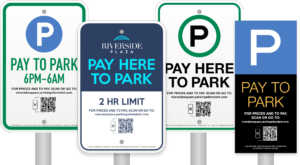Did you know that some people are using QR codes to “hack” parking meters?
If you’ve ever used a QR code, whether on your smartphone or on real estate listings, then you know that they’re usually used to make it easier for consumers to quickly get more information about something like a product or service by scanning them with their smart phone’s camera.
However, in some places, fraudsters have started to use these codes in a very different way. They’re printing fake QR codes on top of real ones that take your money when you scan them with your phone.
It only takes a moment for the fraudster to write down your meter number and add their own code. Once you’ve put coins in the meter, the fraudster takes your money and you will never know it’s happened.
own code. Once you’ve put coins in the meter, the fraudster takes your money and you will never know it’s happened.
Cities like Austin, Texas and Denver, Colorado have all been dealing with this new type of New Jersey parking meter scam .
In one case from Austin, the city tried to warn people about this new trend on social media as well as their website after a few residents complained.
They said they’d heard a few reports of people finding fraudulent QR codes on the meters and they wanted to make sure everyone was aware of the scam before it started happening more often.
In Denver, one resident found that an unknown person had added a QR code to her meter after she parked there for just 30 minutes.
The following day, she went back to the spot and started looking around for clues. She finally found a piece of paper with a code printed on it underneath her windshield wiper.
If you’re ever in doubt about whether or not a QR code is real at a parking meter, there’s an easy way to tell – just look at the last digit of the meter number. If it’s an odd number, then the code is real. However, if it’s even, then someone has tampered with the meter to change the last digit.
easy way to tell – just look at the last digit of the meter number. If it’s an odd number, then the code is real. However, if it’s even, then someone has tampered with the meter to change the last digit.
If you ever come across something like this at a parking meter or anywhere else for that matter, call your local authorities immediately – especially if there are signs of tampering.
On the surface, QR codes seem like a very convenient way to pay for parking. Rather than having to use quarters or credit cards, drivers can simply scan a code that’s displayed on their phone screen and pay through their mobile app. Sounds easy enough; however, scammers have found a way to exploit this technology.
QR codes are being replaced with fraudulent ones that prompt people to download malicious software disguised as popular apps, such as Square Cash. Once the user downloads the app and enters their personal information, the scammer has access to their bank account. One of these scams was recently reported in Youngstown, Ohio.
“Apparently, a scammer is putting up phony QR codes in the city parking meters,” explains Cable 14 News. “If you scan it with a QR code reader app on your phone, it will say ‘Parking Meter Failure’ and ask to download another app so you can pay for your meter.”
This is bad news for your smartphone. If you download the app, it will install a virus on your device. Once the virus is installed, it can track all of your phone activity and even allow someone to monitor or record your calls. The virus could also have access to anything stored on the phone, like photos, bank information and passwords.
your device. Once the virus is installed, it can track all of your phone activity and even allow someone to monitor or record your calls. The virus could also have access to anything stored on the phone, like photos, bank information and passwords.
If you receive a code that looks like this, do not scan it. Instead, call the number on the meter or go to the parking website and pay your parking fee there.
The scam is a good reminder that most QR codes can be easily copied and modified with new information, including those found on billboards, receipts, business cards–basically anywhere you see a QR code. Most apps will ask if you want to proceed when scanning a code, be sure to inquire before scanning.
Be wary of random codes that aren’t in your phone. If the code is on the side of a building or has been ripped, it likely isn’t legitimate.
It’s also important to never give your personal information to strangers. The chances of

this scam happening are low, but it’s always good to be aware and research the company you’re sharing the information with. If something feels too strange or fishy, don’t do it–Scam Likely!
Scammers prey on innocent people every day, and this is no exception. So next time you’re tempted to scan a QR code, think twice before you do it.
This scam won’t be out of circulation any time soon; in fact, more are sure to pop up as scammers continue to find new ways to take advantage of the public. If you find yourself in a situation where you’re presented with one of these scams, just step away and walk on or call the number that’s posted. If it seems suspicious, don’t do it. It’s better to be safe than sorry.”
What do you think? Will these fraudulent QR codes on parking meters be the newest phishing scam to watch out for? Please share your thoughts on our social media pages at Bayshore Interactive!
